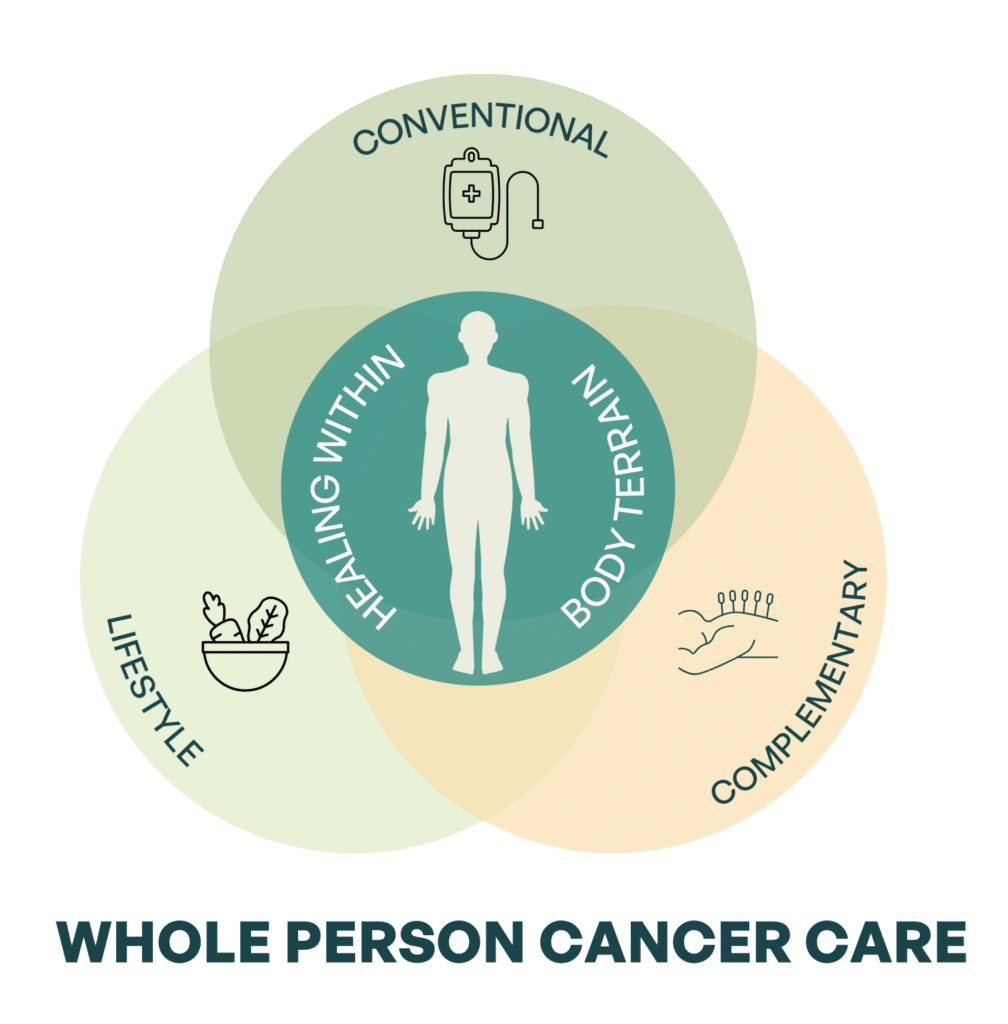Integrative whole person cancer care combines conventional care with the best evidence-based and most appropriate lifestyle practices and therapies—including many rooted in the wisdom of traditional medicine systems—to enhance your quality of life, support you through treatment, and improve treatment outcomes. This type of care offers additional tools to aid in treating the disease while addressing the physical, emotional, social, and spiritual aspects of care.

Whole person cancer care: You are at the center
Your journey through cancer isn’t just about treating the disease—it’s about caring for your entire self. This approach combines the best available treatments while also nurturing your overall well-being, helping you feel stronger and empowered in your own healing. Conventional oncology will focus on directly treating your cancer. Whole person care starts by exploring what matters to you, tailoring your care to your unique needs as a person with cancer.
Expanding your cancer care toolkit
This approach integrates conventional cancer treatments such as surgery, chemotherapy, radiation and immunotherapies with evidence-based tools including:
- Lifestyle practices, such as diet and exercise
- Complementary therapies, such as acupuncture, supplements, meditation and even repurposed drugs
- Optimizing body terrain factors with known links to cancer growth and spread, such as inflammation, insulin resistance and hormone balance
- Proactive work on healing within, to activate the body’s healing potential and to connect more deeply to purpose and peace.
The benefits of a whole person approach
- Improves treatment outcomes: By incorporating additional evidence-based treatment approaches, you can enhance the effects of cancer treatments, reduce complications, and improve your quality of life which may lead to survival benefits.
- Manages side effects: Therapies like acupuncture, supplements, and lifestyle practices can alleviate the side effects of cancer treatments, making it easier for you to continue your care plan and have the best outcomes possible.
- Enhances overall well-being: Focusing on nutrition, exercise, and and more emotional wellness contribute to your resilience, and empowerment in your own healing, even during challenging times.
- Reduces the risk of recurrence: By taking steps to improve your overall health, you can lower the chances of cancer returning, giving you peace of mind for the future.
- Backed by evidence: The therapies and practices used in a Whole Person approach are supported by clinical research. Lifestyle practices like Eating Well and Moving More have some of the most robust evidence for improving treatment outcomes.
Supporting your healing
Cancer treatment often involves a variety of powerful medical interventions. These treatments are essential for addressing the cancer, but they can be hard on your body and spirit. Alongside these therapies, there are ways to support your body through carefully chosen lifestyle practices and complementary therapies that help reduce stress, balance your immune system, and manage side effects. Focusing on areas like nutrition, movement, and emotional needs can create an environment where your body can heal more effectively and feel more resilient during treatment. Mindfulness practices, counseling, or connecting with a support group can help you regain a sense of control and purpose, nurturing your mental strength along the way.
Empowering your choices
This is your journey, and your voice and unique circumstances matter. Integrative whole person cancer care can be helpful at any point of your experience: whether you’ve just been diagnosed, are undergoing treatment or are healing from it. If you have a highly curable cancer, it can be helpful in reducing side effects of treatment. If you have a difficult to treat cancer, a whole person approach may offer additional tools for your healing.
Get started with whole person cancer care resources
Helpful link
Your support helps us expand evidence-based resources on whole person cancer care. Give today and empower healing for people with cancer.

